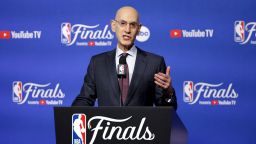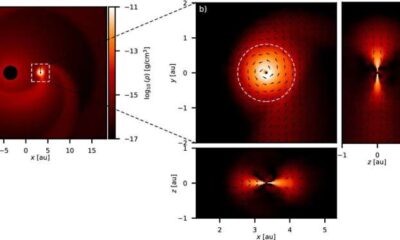Science
NCAA Faces Deadline on Controversial Gambling Rule Change

The NCAA is approaching a critical deadline regarding a proposed rule change that could allow college athletes and staff to engage in betting on professional sports. With accusations of sports gambling proliferating across Major League Baseball, the NBA, and college basketball, the NCAA must make a decision by 5 p.m. ET on November 21, 2023. If two-thirds of the Division I member schools do not file paperwork to rescind the proposal, it will automatically be enacted on November 22.
Currently, the NCAA prohibits college athletes, coaches, and staff from betting on any sport in which it crowns a champion. While horse racing is permissible, sports like baseball, football, basketball, and hockey remain off-limits. However, as sports betting becomes increasingly legal and accessible in various states, the NCAA argues that the existing restrictions on betting by athletes on professional sports no longer reflect the current landscape. The NCAA has made it clear that wagering on college sports will still be prohibited.
Roberta Page, director of athletics at Slippery Rock University and chair of the Division II Management Council, stated, “This change recognizes the realities of today’s sports environment without compromising our commitment to protecting the integrity of college competition or the well-being of student-athletes.”
The proposed change was initially set to take effect on November 1. However, the situation became more complex following the unsealing of federal indictments that revealed two separate sports gambling schemes. These schemes involved rigged poker games and point shaving and implicated members of three New York crime families, two NBA players, and an NBA head coach. The timing of these revelations led to significant backlash against the NCAA’s proposal.
Following the indictments, Greg Sankey, commissioner of the Southeastern Conference (SEC), urged NCAA President Charlie Baker to reconsider the planned rule change. In a letter obtained by ESPN, Sankey expressed concern on behalf of the universities, advocating for the NCAA to maintain strong standards that keep college athletes separate from sports wagering.
Three days after Sankey’s letter, the NCAA announced a delay in its decision. This postponement was not a direct response to public outcry, but rather a result of insufficient support from member votes. Less than 75 percent of the cabinet members voted in favor of the proposal, triggering a mandatory 30-day rescission process. Of the twenty cabinet members who voted, only two representatives from the SEC—Jeremiah Donati, athletic director at South Carolina, and Matt Boyer, assistant commissioner for compliance—supported the proposal despite the commissioner’s objections.
In the weeks following the initiation of the rescission period, the landscape of college sports gambling has continued to shift. Two pitchers from Major League Baseball have been indicted for allegedly rigging games, while six college basketball players from three different schools have received lifetime bans from NCAA competition for their involvement in game fixing.
Most recently, on Thursday, the New Jersey Attorney General’s office announced charges against fourteen individuals, including student athletes, for running an illegal online sports betting scheme linked to members of the Lucchese crime family.
As the NCAA approaches its deadline, the outcome of this decision could have significant implications for the future of collegiate athletics and its relationship with the rapidly evolving world of sports betting.
-

 Science2 months ago
Science2 months agoUniversity of Hawaiʻi at Mānoa Joins $25.6M AI Initiative for Disaster Monitoring
-

 Health2 months ago
Health2 months agoNew Gel Offers Hope for Regrowing Tooth Enamel in Dentistry
-

 Science2 months ago
Science2 months agoALMA Discovers Companion Orbiting Red Giant Star π 1 Gruis
-

 Lifestyle1 month ago
Lifestyle1 month agoPark Jung Min’s Endearing Moment with Hwasa Steals Show at Awards
-

 Science3 months ago
Science3 months agoIROS 2025 to Showcase Cutting-Edge Robotics Innovations in China
-

 Lifestyle3 months ago
Lifestyle3 months agoStone Island’s Logo Worn by Extremists Sparks Brand Dilemma
-

 Lifestyle2 months ago
Lifestyle2 months agoSampson County Celebrates Susie Faison’s 100th Birthday Milestone
-

 Lifestyle3 months ago
Lifestyle3 months agoMary Morgan Jackson Crowned Little Miss National Peanut Festival 2025
-

 Health3 months ago
Health3 months agoStartup Liberate Bio Secures $31 Million for Next-Gen Therapies
-

 Health3 months ago
Health3 months agoTop Hyaluronic Acid Serums for Radiant Skin in 2025
-

 Science3 months ago
Science3 months agoArizona State University Transforms Programming Education Approach
-

 Politics2 months ago
Politics2 months agoJudge Considers Dismissal of Chelsea Housing Case Citing AI Flaws









